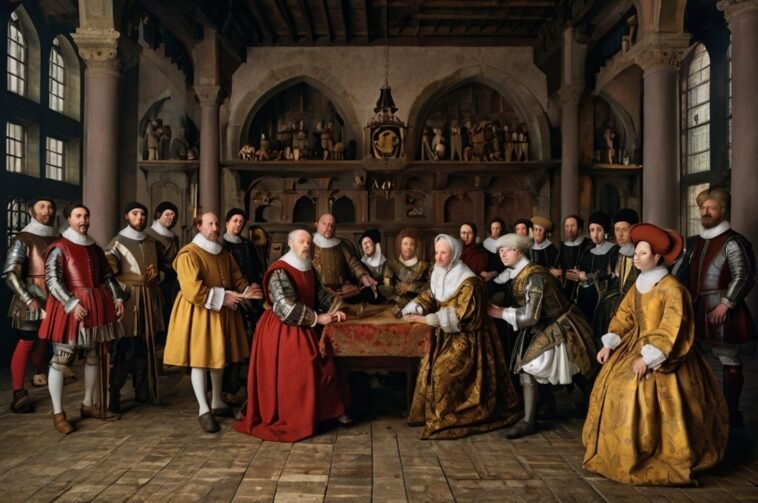
The 16th century was a pivotal time in world history, marked by exploration, conquest, religious upheaval, and profound intellectual advancements.
As Europe expanded its reach across the globe, new trade routes were established, empires rose and fell, and the foundations of the modern world began to take shape.
This era witnessed some of the most significant events that continue to influence global politics, culture, and economics today.
In this article, we’ll explore key developments during the 16th century, from exploration and colonization to religious reformations and groundbreaking scientific discoveries.
Exploration and Colonization
The 16th century is often called the Age of Exploration.
This was when European nations began to venture out to discover new lands and resources.
Driven by advancements in navigation and a thirst for wealth, European explorers began to reshape the world map.
Christopher Columbus
Columbus’ voyages from 1492 to 1504 were pivotal.
Although he wasn’t the first to reach the Americas, his trips opened the door for extensive European colonization.
His discoveries led to the Spanish and Portuguese establishing colonies in the Caribbean, South America, and North America.
This era saw a rush of European powers claiming new territories.
Spanish conquest
The Spanish conquests were among the most dramatic events of this period.
In 1519, Hernán Cortés arrived in what is now Mexico and defeated the Aztec Empire by 1521.
Meanwhile, Francisco Pizarro conquered the Inca Empire in South America in 1532.
These conquests allowed Spain to control vast areas rich in gold and silver.
Portuguese exploration
Portugal also made significant strides, particularly in Africa and Asia.
The Portuguese established important trading ports along the African coast and expanded into India and Southeast Asia.
They controlled key routes and commodities, like spices, which were highly valuable at the time.

Religious Reformation
Religion was another major force shaping the 16th century, with the Protestant Reformation being a central event.
Protestant reformation
This movement began in 1517 when Martin Luther posted his 95 Theses, criticizing certain practices of the Catholic Church, especially the selling of indulgences (payments to reduce punishment for sins).
Luther’s actions sparked widespread religious reforms across Europe.
This led to the creation of new Christian denominations, such as Lutheranism, Calvinism, and Anglicanism.
These new groups challenged the Catholic Church and changed Europe’s religious and political landscape.
Catholic reformation (counter-reformation)
In response to Protestantism, the Catholic Church initiated the Counter-Reformation.
The Council of Trent (1545-1563) was key in this process, aiming to address corruption within the Church and reaffirm Catholic teachings.
The Jesuits, a new Catholic order founded during this period, played a vital role in revitalizing the Church and spreading its influence globally.
Religious wars
The period also saw intense religious conflicts.
For instance, the French Wars of Religion (1562-1598) were a series of battles between Catholic and Protestant factions in France.
The conflict eventually ended with the Edict of Nantes, which granted some religious freedoms to Protestants but left tensions simmering.
Political and Social Changes
Rise of nation-states
During the 16th century, Europe saw the emergence of powerful nation-states.
Countries like England, France, and Spain strengthened their monarchies and centralized power, moving away from the fragmented feudal system.
This shift helped pave the way for the modern state system, where strong central governments became the norm.
The Renaissance
The Renaissance, which began in Italy in the 14th century, reached its peak during the 16th century.
This cultural and intellectual movement celebrated human achievement in art, science, and literature.
It produced some of history’s greatest figures, like Leonardo da Vinci, known for his masterpieces and scientific studies; Michelangelo, famous for his sculptures and paintings; and William Shakespeare, whose plays and poetry have had a lasting impact on literature and drama.
The scientific revolution
This period also saw the birth of the Scientific Revolution, a time when new scientific ideas challenged long-held beliefs about the natural world.
Nicolaus Copernicus introduced the heliocentric model, suggesting that the Earth orbits the Sun rather than the other way around.
Galileo Galilei supported this theory with his improvements to the telescope, allowing him to make significant astronomical discoveries and further validate Copernicus’s ideas.
The Ottoman Empire
The Ottoman Empire was another major player in the 16th century, expanding its territory across Southeastern Europe, the Middle East, and North Africa.
This expansion made the Ottoman Empire a significant rival to European powers, particularly the Habsburg Monarchy.
The rivalry led to several conflicts and wars as the Ottomans sought to extend their influence.

Global Trade and Economic Developments
Explosive growth in global trade
The 16th century saw a dramatic increase in global trade, driven by European exploration and colonization.
The Triangular Trade system emerged, connecting Europe, Africa, and the Americas.
This system involved the exchange of goods like sugar and tobacco, as well as the inhumane practice of the slave trade, which had profound and lasting impacts on all three continents.
Colonialism and mercantilism
European powers embraced colonialism and mercantilism as dominant economic systems.
Colonies were established to extract valuable resources and wealth, and European nations controlled crucial trade routes to maximize their profits.
Mercantilism, with its focus on accumulating wealth through trade surpluses and colonial exploitation, shaped the economic policies of many European countries.
Rise of trading companies
Toward the end of the century, significant trading companies like the Dutch East India Company (established in 1602) and the British East India Company (established in 1600) were founded.
These companies played a crucial role in global trade, controlling vast resources and even maintaining their own military forces.
Their rise reflected the growing importance of commerce in shaping global affairs and marked the beginning of corporate dominance in international trade.
Conflict and Warfare
Anglo-French wars
Throughout the 16th century, England and France were engaged in several wars over control of territories in Europe.
These conflicts were driven by competition for land, influence, and power.
They often involved battles for key regions, impacting political and military alliances.
Ottoman-Habsburg wars
The Ottoman Empire and the Habsburg dynasty (which ruled over Austria and other territories) were involved in intense battles.
One of the most significant events was the siege of Vienna in 1529, where the Ottomans attempted to capture the city.
The failure of this siege marked a crucial moment in halting Ottoman expansion into Europe and was a turning point in the struggle between these two powers.
The Spanish armada (1588)
One of the most famous naval battles of the century was the confrontation between Spain and England.
Spain sent a massive fleet, known as the Spanish Armada, to invade England.
However, the English navy, aided by storms and poor weather conditions, managed to defeat the Armada.
This victory marked the beginning of the decline of Spanish naval supremacy and a shift in power dynamics in Europe.
Thirty Years’ War (1618-1648)
Although this war began just after the 16th century, it was deeply rooted in the religious and political tensions of the period.
The Thirty Years’ War was a devastating conflict involving many European states and was fueled by ongoing disputes between Catholics and Protestants.
It caused widespread destruction and had profound effects on the political and religious landscape of Europe.

Other Notable Events
Invention of the printing press
Johannes Gutenberg’s invention of the printing press in the mid-15th century had a revolutionary impact by the 16th century.
It allowed for the mass production of books, making information more accessible.
This advancement facilitated the spread of new ideas, including religious reformations and scientific discoveries, and played a crucial role in the dissemination of knowledge.
The great plague of London (1563)
This outbreak of plague in London was devastating, leading to the deaths of thousands of people.
The severity of the plague prompted changes in public health policies and a greater focus on preventing and managing such crises in the future.
Spanish inquisition
During the 16th century, the Spanish Inquisition intensified its efforts to identify and eliminate heresy within Spain.
The Catholic Church conducted investigations and trials to enforce religious conformity, often resulting in severe punishments for those deemed heretics.
Witch trials
The period also saw numerous witch trials, both in Europe and in the American colonies, such as Salem.
These trials were driven by fear and superstition, leading to the persecution and execution of many people accused of witchcraft.
They reflect the social and religious anxieties of the time and had a profound impact on communities.

Final Thoughts
The 16th century was a period of significant transformation.
It was marked by major changes in exploration, religion, politics, and science.
Explorers ventured into new territories, religious conflicts and reforms reshaped societies, political powers consolidated and changed borders, and groundbreaking scientific discoveries began to alter our understanding of the world.
These dramatic events were crucial in shaping the modern world as we know it.
They influenced cultures, established new boundaries, and laid the foundation for the economies and societies we live in today.
The impacts of the 16th century are still felt in many aspects of our lives.



